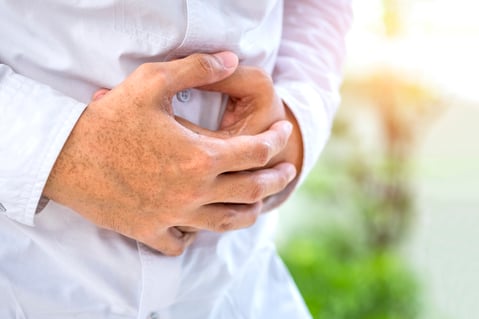How Stomach Cancer Can Look Like Other Conditions
6 min read

Author: Sujatha Nallapareddy, MD
Everyone has a bout of indigestion or a stomachache from time to time. Usually, it's just occasional discomfort after eating too much or, in some cases, eating foods that haven’t been cooked or stored properly.
These mild ailments could instead indicate a more serious condition like stomach cancer, especially if the symptoms don’t go away on their own. How do you know the difference between common stomach problems and stomach cancer symptoms that can feel almost the same?
Inside Your Stomach
To recognize the common signs of stomach cancer, it’s helpful to know what’s going on in your digestive system. Food passes into your stomach through your esophagus, a muscular tube in your throat. Your stomach is a J-shaped organ with acids, enzymes, and other chemicals that break down food so your intestines can extract the nutrients your body needs. Your stomach walls have five layers of tissue that help with digestion and protect the rest of your body from harsh acids. After your food is partially digested, it moves along to your small intestine.
Stomach cancer, also called gastric cancer, is part of a group of conditions called gastrointestinal cancers that affect your stomach and intestines. When stomach cancer develops, it usually begins in the innermost layer, called the mucosa, and spreads outward.
What Does Early Stage Stomach Cancer Feel Like?
In its early stages, stomach cancer often doesn’t cause symptoms. As it progresses, the cancer interferes with normal digestion and the signals your stomach sends to your brain. When these early warning signs of stomach cancer appear, you might feel the following:
 Difficulty finishing meals. You feel full or bloated, even if you only eat a small amount.
Difficulty finishing meals. You feel full or bloated, even if you only eat a small amount.- Discomfort. Your belly frequently feels tight or sore.
- Loss of appetite. You don’t feel like eating much and skip meals.
- Indigestion. You have frequent heartburn or an upset stomach.
- Nausea. You feel sick, like you’re about to throw up.
These early symptoms make stomach cancer challenging to diagnose because they are very similar to conditions caused by a virus or an ulcer. They might also be caused by other kinds of cancers. In diagnosing stomach cancer, your healthcare provider may look for signs of several conditions at once.
As Stomach Cancer Advances
While some digestive problems may go away on their own or after taking medications, stomach cancer does not. In fact, stomach cancer symptoms grow worse over time.
As stomach cancer advances, you may notice:
- Bloody stools. You may see streaks of blood in the toilet bowl or on toilet paper after using the bathroom.
- Fatigue. You feel tired or weak, even if you slept through the night.
- Pain. Your stomach hurts all the time.
- Swelling. Fluids can build up in your stomach and the rest of your abdomen. This condition is called ascites.
- Trouble swallowing. You may feel like food gets stuck in your throat.
- Yellow, itchy eyes and skin. Stomach cancer can cause jaundice after the cancer spreads to your liver or bile ducts. Jaundice is caused by high levels of bilirubin, a yellowish substance formed in your liver.
- Unexpected weight loss. More than 40% of cancer patients report losing weight without trying prior to their cancer diagnosis.
- Vomiting. Your nausea causes you to throw up frequently.
Who Is at Risk for Stomach Cancer?
Because stomach cancer can be so challenging to diagnose in its early stages, healthcare providers look for factors that can put their patients at higher risk, such as:
 Age. Your risk of stomach cancer rises as you get older. Most stomach cancer patients are aged 60 and above.
Age. Your risk of stomach cancer rises as you get older. Most stomach cancer patients are aged 60 and above.- Alcohol use. Alcohol use may increase the risk, particularly if you have more than three drinks a day.
- Diet. Eating a lot of salty or smoked foods and not enough fruits and vegetables.
- Ethnicity. Stomach cancer is more common if you are Black, Latino, Native American, Asian American, or of Pacific Island descent. It is less common in non-Hispanic whites.
- Family history. You may be at risk if you have close relatives who have or have had stomach cancer, particularly children, parents, or siblings. With stomach cancer, this risk factor is not as influential as others. Most people who experience stomach cancer have no family history of the condition.
- Gender. Men are more likely to get stomach cancer than women.
- Medical history. You may be at risk for stomach cancer if you have experienced anemia, frequent heartburn, certain kinds of immune disorders or infections, or stomach polyps.
- Smoking. According to the Centers for Disease Control and Prevention, cigarette smokers are at higher risk for stomach cancer and many other types of cancer.
- Type A blood. For reasons researchers do not yet understand, people with blood type A are at higher risk.
Diagnosing Stomach Cancer
If you are experiencing symptoms of stomach cancer, your doctor will perform tests to examine the stomach and esophagus. These may include:
- A biopsy: Biopsies remove samples of tissue from your body that might be cancerous. Your doctor will send this tissue to a lab to test for cancer. The inside of your stomach can only be reached with a flexible, thin tool called an endoscope. During an endoscopic ultrasound, the tool has an ultrasound probe at the end that helps the doctor guide a biopsy needle to take the tissue sample.
- Blood tests: Your doctor might test your red blood cell count to check for anemia, a common condition during the more advanced stages of stomach cancer.
- Physical exam: Your doctor will check your overall health and look for any signs of disease, including feeling your belly for anything that seems unusual.
- X-rays: After drinking a special liquid that coats the inside of your throat and stomach, an X-ray can reveal signs of stomach cancer.
If your tests come back positive for stomach cancer, your doctor may order imaging tests or surgery to see if the cancer has spread to other parts of your body.
Treatment Options for Stomach Cancer
Following a stomach cancer diagnosis, you and your oncologist will discuss treatment options available based on the extent of your cancer. In many cases, you may need more than one type of treatment. In the early stages of stomach cancer, the best option is often to perform surgery to remove the tumor.
Sometimes, a surgeon can operate without making an incision in your skin. Instead, surgical tools are passed through an endoscope down your throat to remove the cancer and surrounding tissue.
For more advanced cancers, your surgeon may remove part or all of your stomach. Depending on how far the cancer has spread, the surgery may also involve your esophagus and surrounding organs.
Your oncologist may recommend palliative care surgery. The goal of this kind of surgery is to help control the spread of the cancer and relieve your symptoms.
In addition to surgery, your oncologist might also recommend chemotherapy, immunotherapy, radiation, targeted drug therapy, or some combination of treatments. You may qualify for a clinical trial that provides access to a new medication or treatment approach. Learn about available trials and ask your doctor if any are right for you.
At Rocky Mountain Cancer Centers, our specialists are dedicated to finding the treatment that is right for you. Find a physician who will deliver personalized, compassionate care.